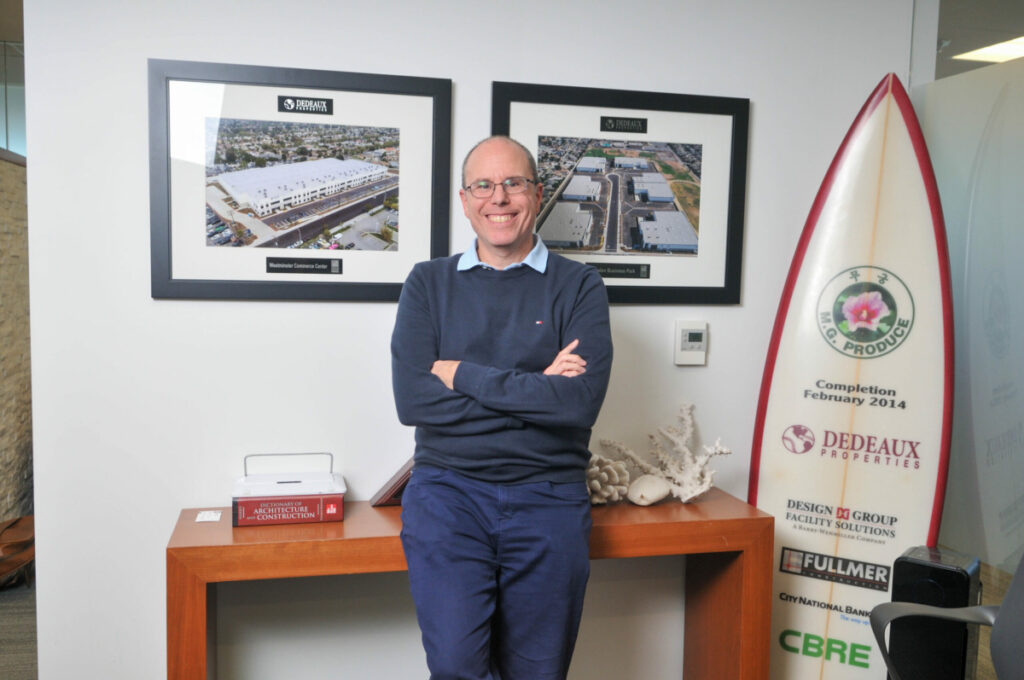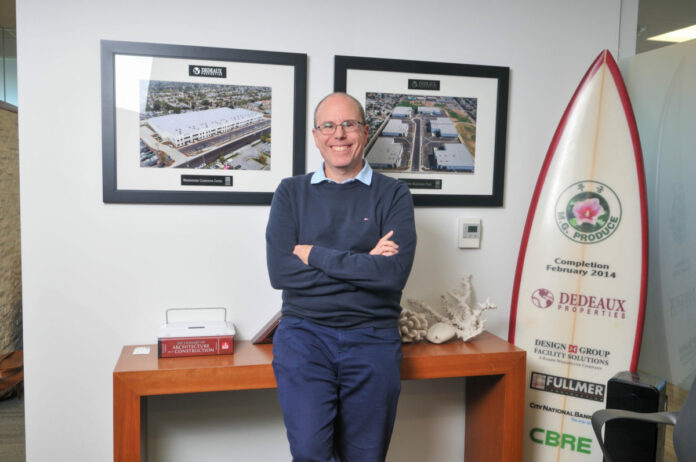Dedeaux Properties, a Santa Monica-based industrial real estate owner and developer, just ended one of its busiest years on record, closing more than $800 million in transactions. It has also ventured north to expand its deal footprint.

Dedeaux maintains a portfolio of approximately 6 million square feet of industrial space. In addition, the firm has an active pipeline of more than 2 million square feet of industrial properties including warehouse/distribution, truck terminals, trailer yards and cold storage facilities.
“We continue to focus primarily in Southern California,” said Dedeaux Chief Operating Officer Alon Kraft. “Inland Empire is the bulk of that.”
Founded by Brett Dedeaux in 2006, Dedeaux Properties closed 14 acquisitions last year totaling $620 million in total budgeted project costs and recapitalized approximately $65 million in existing assets.
The Inland Empire is at the heart of Dedeaux’s narrative with most of its 41 properties based in that region.
“Ontario at one point seemed like the outskirts,” Kraft said. “Now Perris has become a well-defined industrial market. It’s continuing to grow its way out to the east and north. That’ll be where we can build the kind of sites where we can meet the requirements of today’s users.”
Many of Dedeaux’s sites are terminal buildings, which are transitional delivery sites not designed for storage that can range anywhere from 35,000 to 100,000 square feet. High velocity buildings reach 250,000 square feet.
“Terminal buildings tend to be a little smaller,” Kraft said. “They don’t store a lot of product. It’s about moving in product from the port and railroad and pushing it out to other distribution facilities.”
Looking north
Dedeaux also has expanded its Southern California base to the north, acquiring a 12-acre development site at Tejon Ranch in Kern County last February.
The site is entitled for up to 250,000 square feet of industrial development.
Select areas of the 270,000-acre Tejon Ranch site are being developed with nearly 6 million square feet of distribution centers, retail outlets and multifamily projects. Dedeaux has submitted plans for a speculative dry bulk warehouse/distribution facility with 32-foot clear height and excess trailer parking at the site. Construction is currently underway with walls tilted. The project should be complete in nine to 12 months.
“The Greater Los Angeles market is increasingly becoming supply constrained putting upward pressure on rents, which in turn places greater pressure on supply chain costs,” Dedeaux Properties’ Rishi Thakkar, who led efforts on this acquisition, said in a statement. “Tejon Ranch, which is strategically located in the southern portion of California’s Central Valley, is a location that’s proven to represent a superior value proposition for regional users who need to move goods throughout the western United States.”

Dedeaux Properties doesn’t own many warehouses in Los Angeles proper but the few that it does own are located close to its roots.
“The company from its inception started off in Central L.A.,” Kraft said. “We do own some sites in the Central market. It’s been harder to find sites of scale in Central L.A.” Kraft noted that land in the Inland Empire has more available and is cheaper than Los Angeles.
Cold storage specialty
The creation of cold storage facilities has become a Dedeaux specialty.
“We’ve done cold storage for many years both in Southern California and in the Bay Area,” Kraft said.
The company now has a dozen cold storage properties. Cold storage warehousing involves the storing of perishable goods such as food, medicine and artwork at a specific temperature range to maintain their integrity and quality.
Cold storage is in high demand because there’s not a lot of it available.
“There’s a huge void,” said Andrew Briner, an executive managing director at Newmark. “Cold storage is incredibly undersupplied and it’s very difficult to find the right land parcel with the underlying zoning to build those facilities.”
Specializing in areas such as cold storage is part of Dedeaux’s strategy.
“We’ve tried to avoid to just being a commodity warehouse player,” Kraft said, “so we found ourselves in these niche spaces whether it be the terminals trailer yard, high-velocity logistics buildings and cold storage as a way to differentiate what we do and find those opportunities to do better by our capital, our partners’ capital.”
Part of those opportunities include selling warehouses. Dedeaux Properties unloaded $122 million worth of properties last year.
“We will opportunistically look to sell assets,” Kraft said. “Between ourselves and our partners who are involved in our deals, we look for a balancing act of the type of returns we’re trying to get. Where there are strong returns to be made, we will selectively sell those assets.”
Continued expansion
In addition to Kern County, Dedeaux is looking to expand beyond Southern California with plans to extend its industrial enterprise to the Bay Area and other parts of California.
“Our goal is to thoughtfully expand up throughout most of California including further south,” Kraft said. “We’ve got a site in San Juan Capistrano and we’ve been looking at some sites in the San Diego area.”
The market cycle will dictate how much more development Dedeaux continues to see in its pipeline.
Right now, the industrial market in Los Angeles County is incredibly tight, with a mere 1.4% vacancy rate in the fourth quarter, according to Jones Lang LaSalle Inc. data. While the vacancy rate increased slightly in the past year, Mike Tingus of Lee and Associates L.A. North-Ventura noted that the industrial asset class is still healthy in the single digits.
“The markets remain relatively strong,” Kraft said. “It’s fair to say it’s off its peak. But it’s always hard to use the fourth quarter as a barometer in any year because you get the holidays in the way. We continue to see interest in our buildings. But it is taking longer at least the last couple of quarters to get things done as folks have likely been a little nervous given the economic headwinds whether it’s war in Ukraine, interest rate increases, etc.”
Overall, coming out of Covid, the market has remained robust despite something of a slowdown, Kraft said.
“We continue to see a lot of demand,” Kraft said. “A lot of the folks in the logistics space are still looking for a lot of space. There’s been some stabilization in the marketplace that we view will ultimately be favorable for the market even if we’re not going to be at peak levels of activity.”
While recession may continue to threaten the economy in the new year, other key indicators remain positive, according to Kraft.
“Consumer sales remained strong through the holiday season and will likely remain strong into 2023,” Kraft said. “We’ll likely see a shift from larger durable goods to smaller ones and other non-durable items which portends for industrial demand to remain resilient.”

